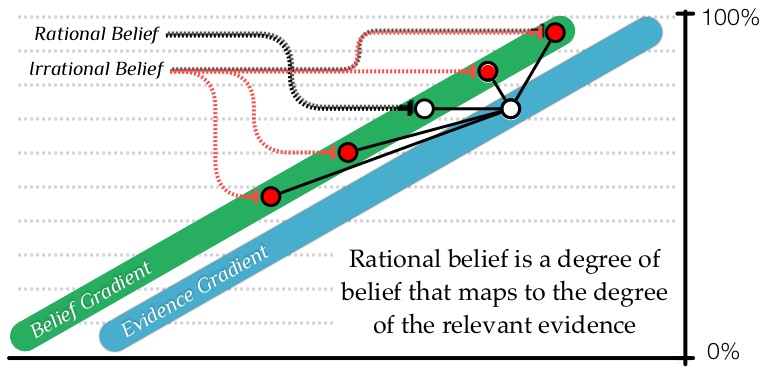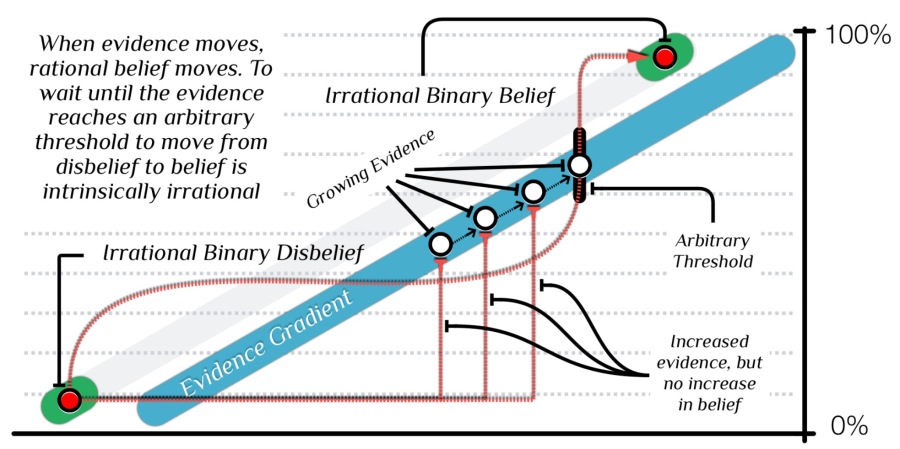 Imagine a tiger chasing you through the jungle. Ahead you see a piranha-infested river. It is not a good day. However, you see a vine hanging over the river that you suspect may hold your weight. You give the vine a very brief analysis, and decide that there is only a 20% chance it will support a Tarzan-like swing to safety. But it is your only hope. So you grab the vine and…
Imagine a tiger chasing you through the jungle. Ahead you see a piranha-infested river. It is not a good day. However, you see a vine hanging over the river that you suspect may hold your weight. You give the vine a very brief analysis, and decide that there is only a 20% chance it will support a Tarzan-like swing to safety. But it is your only hope. So you grab the vine and…
Suddenly a God steps out from behind a tree and freezes time. “What are you doing?” he asks. “You can’t believe half-heartedly! If you are going to make a choice, you have to believe with all your heart!” You are excited about finally speaking to a God who can actually introduce himself, but find yourself puzzled at his comment. “But why would making a choice require that I increase my initial assessment of the strength of the vine to near certainty?” “Either you believe or you don’t” he says. “You can’t doubt. A double-minded man is unstable in all his ways.” What would you think of such a God?
Every place in the Bible that refers to belief for salvation treats such belief as something binary: either you believe or you don’t. There is no instruction anywhere in the Bible to proportion your degree of belief to the evidence. In fact, James 1:8 makes it clear that the doubter is “unstable in all his ways”.
Contrast this with the type of belief that has lead to the success of science. In science, we look at the balance of evidence, then map our degree of belief to that balance of evidence. This is also true when we assess the reliability of people. If you decide to marry someone who has a history of alcohol abuse, but who has promised not to drink again, you only foolishly place full confidence in that promise, in spite of your immense love for the person.
Re-examine the passages in the Bible that deal with salvation. Consider the following questions. Does the context include the following?
- A requirement to scrutinize the evidence prior to belief.
- A requirement to align your degree of belief to the degree of the evidence.
- A requirement to learn and apply tools of rationality to your assessment.
Has redemptive belief changed today? Do Sunday Schools include the requirements listed above when encouraging children to believe in Jesus? When other religions encourage children to believe without these other requirements, should they be considered noble and virtuous?
ADDITIONAL NOTES:
Some people find it emotionally uncomfortable to position their degree of belief somewhere between absolute belief or absolute disbelief. They therefore construct an arbitrary threshold at which their disbelief suddenly flips to belief, or at which their belief suddenly flips to disbelief. Yet, the emotional discomfort in holding nuanced belief position does not invalidate the fact that a nuanced degree of belief mapping to the degree of the evidence is the only coherent definition of rational belief. For many, the natural evidence gradient is cut and polarized into something quite binary with an arbitrary threshold at which belief flips to disbelief and disbelief flips to belief.

Belief is at the very core of Christianity. Whether you believe in Jesus determines your eternal destiny according to the Bible. Yet, Christian leaders themselves seem not very able to articulate just how much belief is sufficient to flip your destiny from eternal damnation to eternal bliss. The following are some of the more popular notions of the belief threshold necessary for salvation:
- Absolute 100% belief.
- A “high” degree of belief.
- Anything over 50%.
- Anything greater than 0%.
Christians leaders can not agree on this notion that is at the very foundation of Christianity.
Rational belief is a degree of belief that maps to the degree of the relevant evidence. When Christian leaders are forthcoming in the degree of belief necessary for salvation, they seldom, if ever, state that the degree of belief must necessarily map to the degree of the relevant evidence as perceived by the believer. And in this Christianity is irrational at its very core.
(See also #07.)

